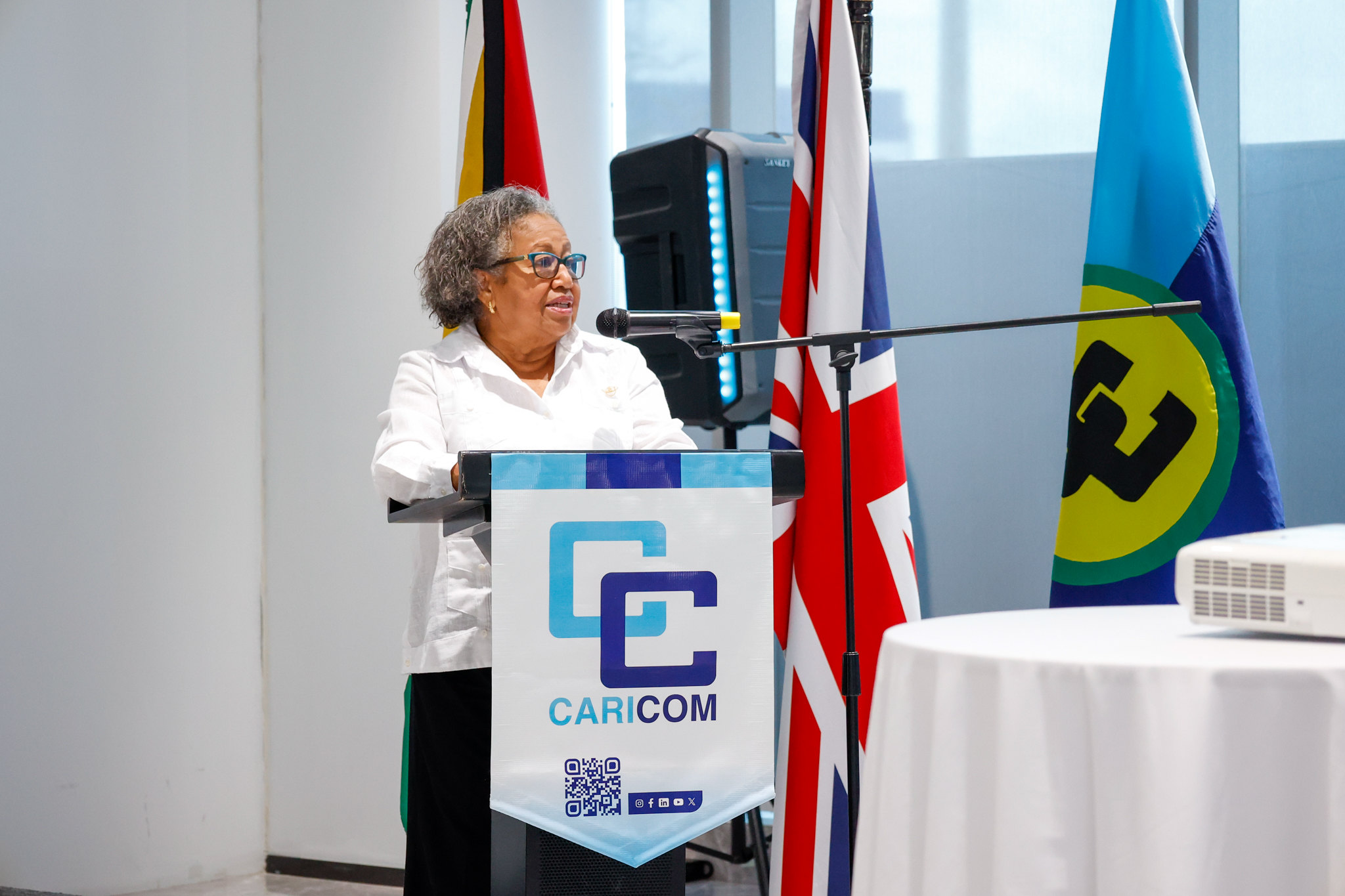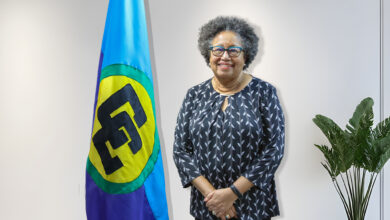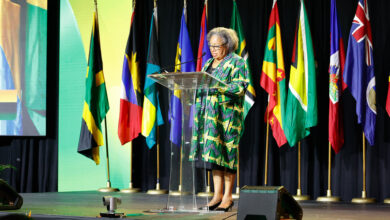CARICOM Secretary-General Dr Carla Barnett, delivered remarks at the Opening Ceremony for the Member State Consultation of the Draft CARICOM Ocean Policy and Governance, which began on 22 July at the Pegasus Business Centre, Georgetown Guyana.
For CARICOM, the ocean is not merely a geographical feature, it goes to the essence of our identity, our culture and our survival. It is our historical highway and our connection, our pantry, our playground, and our provider. Our oceans supply 50% of the oxygen we breathe and are also a significant carbon sink in the climate fight. They sustain a rich biodiversity that is intrinsic to our natural heritage.
I am pleased to join you at this Regional Consultation on the Draft CARICOM Ocean Governance Policy. Your presence today, representing diverse interests and expertise from across our Community, underscores the collective commitment we share towards the sustainable future of our vital resource, the ocean.
We are meeting in difficult times. Our small, vulnerable economies are largely still recovering from the impacts of the COVID-19 pandemic across our Region. Rising food and other living costs, a volatile international trade policy landscape and persistent supply chain disruptions, are increasing economic uncertainties and pushing many of our citizens towards food insecurity. The Caribbean Community (CARICOM) Secretariat partnered with the World Food Programme in 2024 to update the food security and livelihoods surveys, and the results showed a 78% in food insecurity among Caribbean citizens compared to pre-COVID data.
The increasing impact of climate change makes all these challenges worse. It imposes with increasing frequency and ferocity, natural disasters of every shape and size that erode development gains. While science is indicating that the outlook for Small Island and Low-lying Coastal Developing States (SIDS) is becoming even more grim, in the global diplomatic arena, the ambition for transformative change to effectively address climate change is at an all-time low. Despite this, or because of this, climate resilience, diplomacy and fair access to finance have become a top priority for our leaders.
This bleak reality underscores the importance of this Consultation and, more importantly, the need for regional cooperation. These challenges for our Region have potential solutions in our surrounding Caribbean Sea and adjacent Atlantic Ocean.
CARICOM collectively encompasses approximately 1.8 million square kilometers of maritime space, an average 4 to 1 ratio compared to land territory. This ratio is much higher for the smaller islands among us.
For CARICOM, the ocean is not merely a geographical feature, it goes to the essence of our identity, our culture and our survival. It is our historical highway and our connection, our pantry, our playground, and our provider. Our oceans supply 50% of the oxygen we breathe and are also a significant carbon sink in the climate fight. They sustain a rich biodiversity that is intrinsic to our natural heritage.
Yet, this invaluable resource is under unprecedented pressure. As we have collectively acknowledged in numerous forums, including the recent Forty-Ninth Regular Meeting of the Conference of Heads of Government, our Region faces rising sea levels, ocean acidification, and increasingly intense hurricanes, all of which pose direct, existential risks to our coastal communities and ecosystems, as well as to the critical infrastructure that underpin our economies. The persistent influx of sargassum seaweed, for instance, has inflicted major economic damage on our vital tourism and fishing sectors. In addition to climate change, pollution and overfishing are relentlessly degrading our marine ecosystems.
In the face of these formidable challenges, our oceans still hold immense promise as a powerful engine for realising the objectives of the Revised Treaty of Chaguaramas. The “blue economy” framework represents a paradigm shift – a move beyond traditional sectors to embrace a sustainable and integrated approach to ocean resource management.
The World Bank places as value of approximately US$407 billion on CARICOM’s ocean economy. This is not just a number. It represents a vast, untapped potential to catalyse economic growth, create jobs and foster prosperity for our citizens. Our long-standing economic pillars of coastal tourism, fisheries and aquaculture remain foundational. Tourism, for example, accounts for an estimated 50% of the Eastern Caribbean’s gross domestic product (GDP). Our fisheries sector provides direct employment for over 120,000 fishers and supports thousands more indirectly. It is essentially a cornerstone of regional food security. We must make these pillars more productive and sustainable.
But the blue economy is expanding. We are actively cultivating emerging industries, such as:
- Maritime transport, which is crucial, and must be reliable and efficient, in order to improve the movement of goods and people;
- Marine multitrophic aquaculture as a pathway to sustainable, ecosystem-based seafood production;
- Marine renewable energy to reduce our reliance on fossil fuels; and
- Marine biotechnology applications, which are projected to double to a 13-billion-dollar industry. The Biodiversity Beyond National Jurisdiction (BBNJ) and Nagoya Protocols offer critical pathway to these industries.
These sectors are pivotal for diversifying our economic base and reducing vulnerability to global shocks. This is not merely about economic statistics, it is about tangibly securing a prosperous future and a legacy of sustainability for all spheres of our society. The blue economy provides crucial income streams, particularly in our coastal communities, contributing directly to poverty reduction and enhanced livelihoods. It is also deeply intertwined with our cultural heritage.
Ladies and Gentlemen, to truly harness ocean wealth sustainably, we must prioritise two fundamental support pillars: Ocean Literacy and Capacity Building.
Ocean Literacy is critical for effective ocean management and sustainable blue economic growth. It goes beyond merely understanding facts about the ocean, it encompasses communication and decision-making. It means instilling in our citizens, from schoolchildren to policymakers, a profound understanding of the mutual influence between humans and the ocean. It means embracing the complex inter-connectedness of systems from ridge to reef, and how we can prosper in these systems. But most importantly, we cannot effectively and strategically plan industries and economies without a deep understanding of the resources.
This brings me to the equally vital need for Capacity Building. Developing our ocean economies sustainably requires a broad interconnected research agenda, knowledge management, a skilled workforce, robust institutional frameworks, and access to appropriate technologies and financing. This will require amongst other things:
- Investing in programs to equip our people with the skills needed for emerging blue economy sectors.
- Strengthening our scientific capabilities to better understand our ocean resources, monitor their health and inform evidence-based policy.
- Fostering cross-sector collaboration among governments, academia, the private sector, and local communities. This includes, supporting locally relevant outreach and citizen science initiatives.
- Continuing to advocate for innovative financing mechanisms, the most recent of which was Barbados’ “Blue Bonds for Ocean Conservation” initiative, which restructured USD 150 million of debt to unlock USD 50 million in new funding for marine conservation.
It is also imperative for capacity building to include and prioritise improved domain awareness, and territorial integrity in our maritime zones. The Ocean Policy will, therefore, synergise with the Maritime Security Policy to promote capacity building for both environmental monitoring and maritime surveillance.
In doing this work, we must recognise the support of the Government of the United Kingdom, as we formulate a CARICOM Ocean Policy. This builds on an active partnership, which includes programming of the Commonwealth Blue Charter Implementation and the Sustainable Ocean Economies Programme, that have supported national blue economy scoping in several CARICOM Member States. We are very appreciative of your consistent and dependable support.
I hope that the next two days of consultation will be inclusive and robust, as you identify key challenges, brainstorm innovative solutions, and ultimately establish a prioritised action plan and governance arrangements for our shared Ocean Policy, so that we are able to collectively manage our ocean resources wisely and sustainably.
I thank you.






